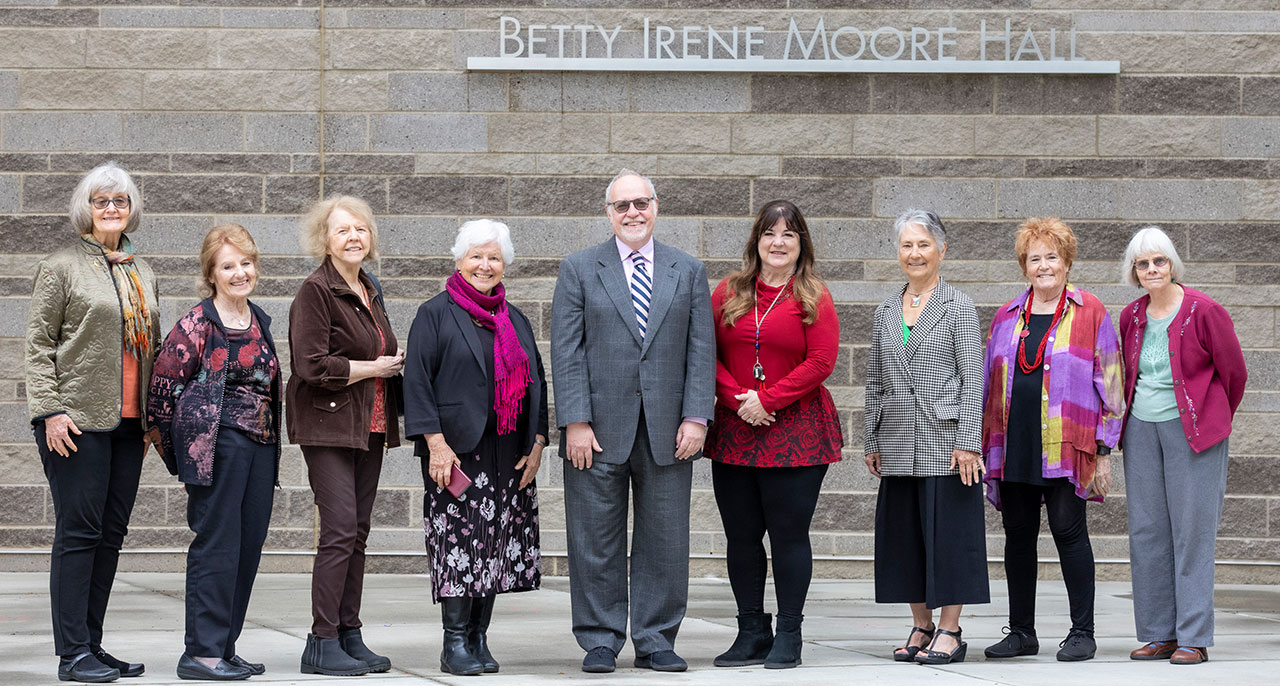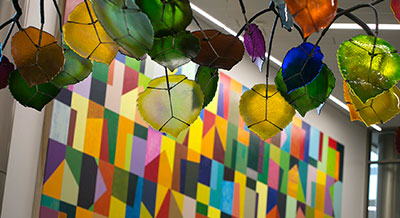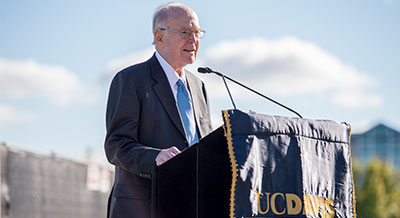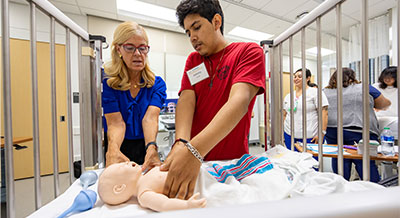At 29 years old and with six years as a nurse under her belt, Pat Foster wanted something more. Working on the border south of San Diego with Chicana girls, she felt inadequately prepared to handle all the issues they were facing.
So, she joined 16 other nurses in a pilot program at UC Davis to prepare family nurse practitioners. In September 1971, both the program and the profession were unknowns.
In May 2023, members of that inaugural class returned to Sacramento and reconnected 50 years after their graduation.
“We all seemed to have different memories and there were some big gaps in what we remembered about the specifics of the program,” says Pat Foster, a Class of 1973 alumna. “The beautiful Betty Irene Moore School of Nursing campus was amazing. The curriculum with its focus on diversity, working with the community and focus on home health and seniors and underserved seems very appropriate.”
“We were the wild west”
That focus stems from the original vision that Mary O’Hara-Devereaux, the program’s first director, had in the late 60s. While volunteering at a migrant health worker clinic in Winters, Calif., a physician there told her he could train her, a nurse, to treat and diagnose common problems in eight weeks.
“He told me I could lose my license. But I’ve always been a risk taker and an innovator, so I took it on,” O’Hara-Devereaux recalls. “I thought if I could do this, any nurse who wants to do it can do it.”
With UC Davis Chancellor Emil Mrak’s encouragement, she launched a family nurse practitioner (F.N.P.) program, housed within the young UC Davis School of Medicine. Both were focused on solving California’s lack of primary care, especially in rural and underserved areas.
“If you’re going to be an innovator, you have to have all the things around it to make it possible. I got it in my blood and it was almost like nothing could stop me. I had to get laws changed so nurses could do this work outside their license,” O’Hara-Devereaux says.
While everyone agreed on the need for more primary care providers in California, the nurse practitioner profession was both innovative and unorthodox, which led to many questioning its legality. The leaders of the UC Davis program gained support from Sen. Alfred Song who ultimately passed the Experimental Health Manpower Act in 1972, allowing N.P.s and physician assistants to practice under medical supervision.
O’Hare-Deveraux recruited students who shared her passion for rural health care. Graduates earned a Master of Health Services Degree in Family Nurse Practice, which she lobbied UC Davis’ graduate division to approve. Upon completion 50 years ago this year, graduates faced a harsh reality.
“When we came into the program, we all may have had a different idea of what this was because it was so new,” recalls Foster, a graduate from the first class of the program.
“We were the wild west,” adds her classmate Vicki Houle, 24 at the time. “It was needing to wear a flak vest every day. We had pushback from the physicians and the nurses. We were fighting on a survival level.”
Serving the underserved
In addition to the hurdles of being accepted in practice, program leaders also faced a test in getting the students exposed to rural areas and the populations of greatest need. After one year of didactic instruction and some clinical exposure, the students embarked on a 6-month-long preceptorship, or training, in rural locations.
Those early experiences planted a seed in many in that very first class. Foster would go on to work several years in Cali, Colombia, to teach F.N.P. skills to master’s-level nursing students from four Latin American countries. Houle co-owned a practice in Tahoe City and helped launch a nursing program in Swaziland (now Eswatini) with the Peace Corps. And Betty Labastida would spend one half of her 40-plus-year career in eight countries with the U.S. Department of State Foreign Service, and the other half working in county medical services along the West Coast.
“It was my dream job,” Labastida says. “I feel fortunate that the program prepared me to be part of the change.”
A profession and legislation evolve
The Manpower Development and Training Act was the first of several legislative acts that were completed to provide permanent support. In fact, not until 2020 did N.P.s gain the power to practice independently via Assembly Bill 890. The bill requires in a phased-in approach making eligible nurse practitioners fully independent around 2026.
“We fought to change prescription privilege. It took us five times working with the legislature to get that passed,” Houle recalls. “When we went down in flames for independent practice, I realized what tough skin we had to have.”
As those early N.P.s pioneered their new roles and the profession itself, the UC Davis program, which also included a physician assistant program, evolved. In 1974, it earned accreditation by the American Medical Association and opened to all nurses as a certificate program. After 40 years of successful contribution to the primary care workforce, both programs transitioned to the new Betty Irene Moore School of Nursing at UC Davis in 2013 and, just as that first class, at the master’s-degree level. Now the 111 graduates from the School of Nursing’s program join the 1,800 who graduated from the medical school.
Celebrating a half century
The reunion was their first chance to connect with the new School of Nursing, visit Betty Irene Moore Hall, tour the modern simulation suites and realize the value of their contributions.
“It’s amazing what these people have done over the past 50 years. I met some current students and felt that spirit to care for those who most need it there. I’m thrilled about that,” O’Hara-Devereaux says.
“They have had an incredible impact on UC Davis, California and beyond,” adds Dean Stephen Cavanagh. “We relished the opportunity to celebrate their accomplishments and let them know that even though they graduated from the School of Medicine, we consider them part of our School of Nursing family too.”
The graduates committed to staying in touch, bound together by their shared sense of passion and innovation.
“I think we proved ourselves, therefore we proved it for UC Davis,” Houle adds. “I think it was a win-win for both of us.”






